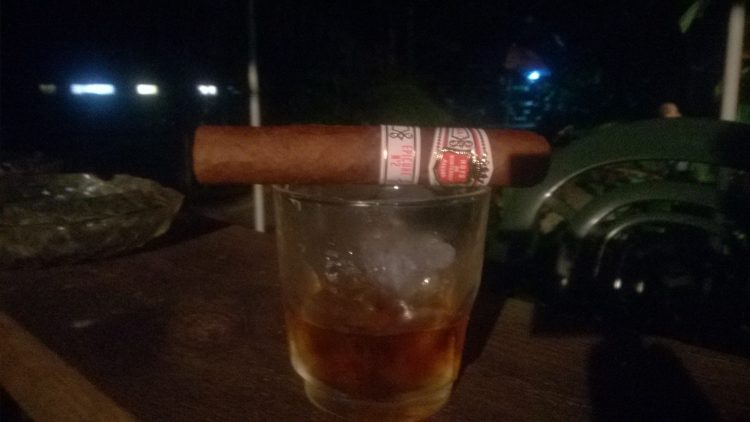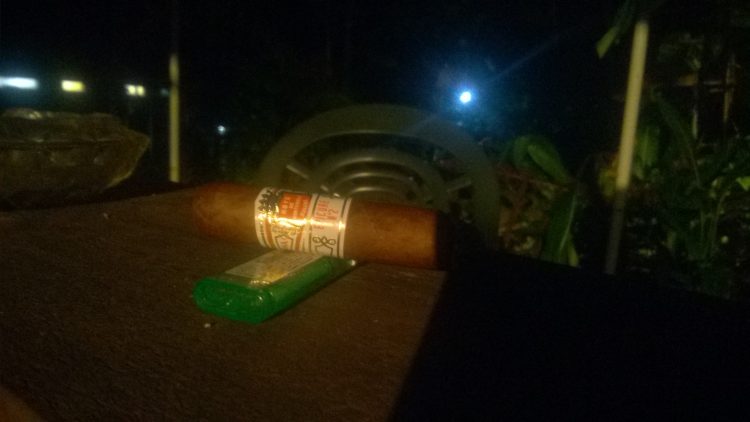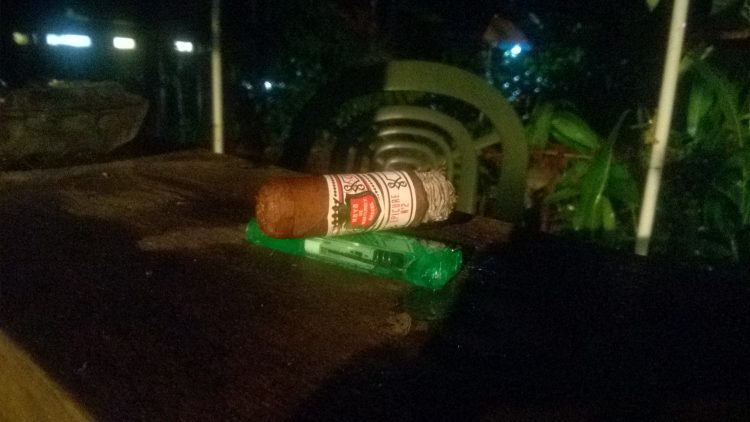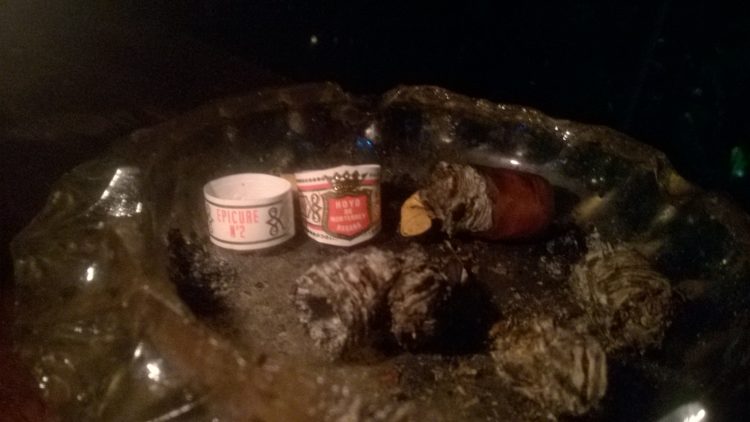Your intrepid reporter is deep in the jungles of Northern Australia, where the white noise of the cicadas is loud enough to make conversation difficult. My hostel has the aspect of a safari lodge: the bar is a few roughhewn wooden benches under a great green tarpaulin, strung between three ancient trees. My fellow travellers all speak with different accents, none of them Australian.
The place bills itself as a ‘wilderness retreat.’ My room, some fifty meters away down a narrow path through the dense foliage, is a meagre hut, with flyscreen walls and a tarpaulin roof. There is no power after they shut the generator off at 10pm. We are several hours north of the nearest mobile phone coverage, and there is a sign by the bar that gently advises us not to bother enquiring about the WiFi: “The best connection you can make” it suggests, “is with each other.”
I feel like there is no better way to bond with my compatriots than by lighting up a cigar: after all, what could a bunch of eco-tourists possibly object to about a Cuban cigar, the most natural product on earth?
Like its thinner sister, the Hoyo de Monterrey Epicure No. 2 is an ancient cigar, having survived since the revolution. Once upon a simpler time, these came in cabinets of 50, and wore no bands. Since 2008 they have two, giving this example less age than that. It is the oldest of the still extant robustos, an early forebear of the fat-cigar trend.
As an accompaniment, I order a glass of the highest shelf local spirit in the house: Bundaberg Black, neat. The bartender makes a show of carefully measuring out the shot. “You don’t want me to give you too much of this stuff, mate.”
He’s not wrong. Pure gasoline.
Set ablaze, the cigar opens in a pleasant but inoffensive manner. The predominate flavour is mid-strength tobacco, tending towards mild. It is grassy, with strong notes of hay, accompanied by saddle leather and a hint of wet animal, to complete the barnyard melange.
I arrived in the jungle yesterday, and slept only fitfully: not only is there the constant cacophony of the cicadas, which only the mating calls of the bush turkeys and cassowaries can break through, but also every ten minutes a nut falls from the tree above my hut and lands on the tarpaulin like a gunshot. My wakeup-call this morning came in the form of a marsupial mouse, who crawled onto my pillow from places unknown. I was dozing when I felt his hot breath in my ear, and inquisitively rolled over to find us face to face. With a primal yawp I leapt out of bed, and he fled. Unable to locate either the point of the critter’s entry or of his exit, I decided the best strategy was to vacate the hut myself. On the porch I found a four-foot iguana, and I encouraged him inside to ferret out the rodent, but the slovenly lizard didn’t seem interested.
By midday I found myself in the local swimming hole. Some kids were downstream of us, swinging off a rope, laughing, and cursing like sailors at their disobedient Blue Heeler, Gypsy. Eventually they left, with most of them roaring off in their beaten up four-wheel drive. One of their number, however, came towards us to collect his things – a towel and a short digeridoo – that lay on the river bank near where we were swimming.
He was a lanky teen, with a pile of red hair. His skin was parchment white; his pants would have been a similar tone, but had been rendered transparent by the water, making the chestnut thatch of his mons pubis distractingly visible. He hailed us from the shore with a ponderous drawl of the Australian bush philosopher.
“Youse from around here?”
I told him I was from Melbourne, and he sighed.
“I don’t like the city” he told us. “I’m from the Daintree, born and raised for nineteen years. I went to Sydney once. I thought the jungle had made me a man, but that city made me a little boy.”
My companion is from California, and she told him so, and he seemed to like that a little better. “Yeah, I reckon that’d be alright. I reckon California would be like the Daintree.”
I laughed, and told him that I’d been to both, and they were similar. “Wouldn’t you like to go somewhere a little different though? See the world?”
“Why would I ever want to go anywhere else, when it’s so beautiful here?”
I asked about his digeridoo. “Oh, I love me dige,” he told us. “Can I play you a tune?”
The lad was good, conjuring from the dige at least as tonal a sound as I’ve ever heard from one, with a syncopated section reminiscent of an electronic dance track. For his finale he plunged the end of the stick into the water of the creek, slowly pushing it deeper and deeper, muffling the sound, but creating a maelstrom of bubbles around it. Finally, he withdrew it, gasping for air.
“I do that to improve my lungs” he told us. “If I could play my full size dige when it was all the way in the water like that, I’d have the strongest lungs in Australia.”
Just past the midway point the cigar starts to get bitter and ashy, but is somewhat redeemed by a very mild sweetness on the aftertaste. The flavours, in the rare place where anything definable penetrates the bitterness, are much unchanged: tobacco and dry grass. Some cedar.
Without warning the heavens open, a torrential downpour that pounds on the tarpaulin roof, competing with the white noise of the jungle. The low-point of the roof is nearby, forming a spout where the rain cascades off like a waterfall. A fast-flowing creek immediately forms on the ground beneath, disappearing off into the bush. Toads emerge, seemingly from nowhere, splashing about on the riverbank.
Within fifteen minutes it is over, and the air returns to its regular warm and humid state. The bush turkeys resume their cries.
The final inch of the cigar reveals the life in the thing. The tobacco grows from medium toward strong. The sharp bitterness is gone, replaced by the richer, and much more pleasant bitterness of heavy tar, with nuttiness (peanuts), and some tropical fruit notes in the back of the thing.
Hoyo de Monterrey Epicure No. 2 is not a terrible cigar by any means, but nor is there especially much too it. I’d take it before the Epicure No. 1, but it still runs a distant second to Partagás Serie D No. 4.



